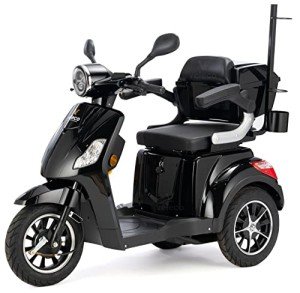Mobility Scooters: A Comprehensive Guide
Mobility scooters have actually ended up being a vital mode of transport for many individuals dealing with mobility obstacles. This post explores the numerous elements of mobility scooters, including their types, benefits, functions, and a guide for prospective buyers.
Understanding Mobility Scooters
Mobility scooters are electrically powered gadgets developed for individuals with limited mobility. They provide a means of transportation for individuals who might have difficulty walking but still want to maintain their self-reliance. They come in various designs and functions to accommodate a wide variety of needs.
Kinds Of Mobility Scooters
Mobility scooters can normally be categorized into 3 main types:
| Type | Description | Best For |
|---|---|---|
| Compact Scooters | These are small and lightweight, perfect for indoors and short journeys. | Users with limited storage area or those who travel frequently. |
| Mid-size Scooters | A balance between portability and stability, appropriate for both indoor and outdoor usage. | Those who require to cover a variety of surfaces. |
| Heavy-duty Scooters | Big and robust, designed for rugged outdoor usage and much heavier people. | Users requiring extra weight capability or going off-road. |
Secret Features of Mobility Scooters
The choice of mobility scooter often depends on the features that align with individual requirements. Here are a few of the key features to think about:
- Weight Capacity: Mobility scooters include different weight limitations. It is vital to select a scooter that can adequately support the user's weight.
- Range: The range a scooter can take a trip on a single charge varies. Depending on user requirements, one may go with scooters with a series of approximately 40 miles.
- Speed: Most mobility scooters can reach speeds between 4 to 8 mph. Consider what speed is comfortable and safe for the desired environment.
- Turning Radius: A compact turning radius is vital for indoor use, permitting simpler navigation in tight spaces.
- Battery Type: The type of batteries utilized can impact the scooter's performance. Lead-acid and lithium-ion batteries are the most typical.
Benefits of Using Mobility Scooters
The benefits of mobility scooters extend beyond simply transport. Some crucial benefits include:
- Independence: Users can browse their environment without counting on caregivers, promoting independence and self-confidence.
- Health Benefits: Using a scooter can motivate outdoor activity, leading to physical and psychological health improvements by lowering feelings of seclusion.
- Convenience: Scooters can easily be run in different environments, whether indoors, in mall, or outdoors.
Important Considerations When Buying a Mobility Scooter
When purchasing a mobility scooter, a number of considerations can help guarantee that you select the best design:
Assess Individual Needs:
- Mobility level: Consider how much support the individual will need.
- Variety of use: Determine where the scooter will mainly be used (inside your home, outdoors, on rough terrains, etc).
Test Drive:
- Always test drive a number of designs to discover an appropriate fit. Take notice of comfort, ease of steering, and the scooter's responsiveness.
Evaluation Safety Features:
- Look for scooters with sufficient security functions like lights, signs, and anti-tip styles.
Check Warranty and Service Options:
- A reputable warranty and readily available service alternatives are crucial for long-lasting usage.
FAQs about Mobility Scooters
1. How fast do mobility scooters go?Mobility scooters usually have speeds varying from 4 to 8 mph, with a lot of created for security instead of high-speed travel. 2. Are there weight constraints on mobility scooters?Yes, mobility
scooters come with particular weight limits, often ranging from
250 pounds to over 500 pounds, depending upon the model. 3. Can mobility scooters be utilized indoors?Certain designs, especially compact scooters, are particularly created for
indoor usage and are simpler to navigate in tight spaces. 4. How typically do the batteries need to be replaced?Battery life can differ based on use, however typically, with correct care, batteries may last between 1 to 3 years before requiring replacement
. 5. Are mobility scooters covered by insurance? disability scooters can vary, however some insurance plans, consisting of Medicare and Medicaid, may cover part of the cost. It's recommended to contact specific insurance suppliers. Mobility scooters serve as a
important tool for many people, allowing them to maintain
their freedom and independence. By understanding the various types and functions of mobility scooters, individuals can make informed choices tailored to their particular requirements.
Whether used for errands, interacting socially, or leisurely activities, mobility scooters can boost the quality of life for those with mobility limitations. Purchasing a mobility scooter is a decision that can considerably affect a person's life. Therefore, individuals must carefully evaluate their choices and pick a design that best lines up with their lifestyle and mobility requirements
.

